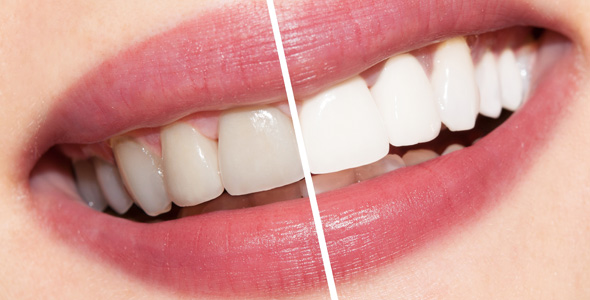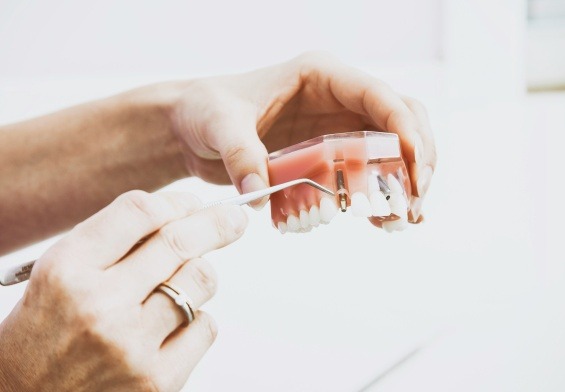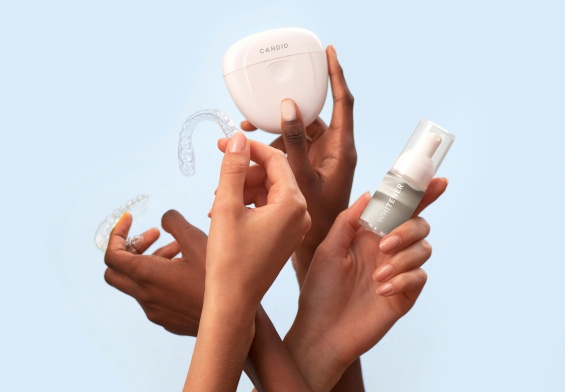Your teeth stay porous for about 48 hours after teeth whitening in New Jersey. That makes them more susceptible to stains and discoloration. The food you eat during this window has a huge impact on your whitening results.
The whitening process opens microscopic pores in your tooth enamel, allowing bleaching agents to remove deep stains. But, these same pores can absorb new stains from dark foods and drinks until they reseal. That’s why dentists recommend following a “white diet” for at least the next 48 hours after a whitening treatment.
Choosing the right foods can make the difference between results that last months versus years.
Key Takeaways: What to Eat and Drink After Teeth Whitening
Follow the white diet for 48–72 hours after treatment. Try to only eat light-colored, low-acid foods and beverages that won’t stain your newly whitened teeth or cause sensitivity.
Best Foods to Eat (Safe Options) Light-colored, low-acid foods that protect enamel:
- Scrambled egg whites – minimal pigment and gentle on sensitive teeth
- Plain yogurt or cottage cheese – soothing, calcium-rich, and non-staining
- White rice, mashed potatoes, pasta with white sauce – filling starches without colorants
- Skinless chicken, turkey, or white fish – lean protein with no dark marinades
- Cauliflower, peeled apples, and bananas – light fruits and vegetables with low acidity
- Plain bagels, crackers, and white bread – neutral carbohydrates
Best Drinks to Have (Safe Options) Colorless or pale beverages that won’t leave residue:
- Water (especially fluoridated tap water) – hydrates and supports remineralization
- Skim milk or coconut water – non-pigmented and tooth-friendly
- White tea (unsweetened) – milder alternative to coffee with reduced staining risk
- Low-sugar vegetable juices (cucumber, celery) – hydrating and color-neutral
Why Does Diet Matter After Teeth Whitening?
Your tooth enamel becomes temporarily porous during whitening treatments. Professional whitening agents like carbamide peroxide and hydrogen peroxide create microscopic channels in enamel.
Those channels stay open for 24–48 hours, making teeth vulnerable to new stains during that time. Research shows that teeth can absorb pigments much faster during this recovery period.
The porous enamel also exposes dentin layers. That’s why many people experience temporary sensitivity. Following proper dietary guidelines allows enamel to remineralize and pores to close naturally.
What Foods Can I Eat Immediately After Teeth Whitening?
Think of your freshly whitened teeth like a white shirt. Any food or drink that would stain a white shirt will also stain your teeth. Thus, avoid those foods for 48 hours. Eat lighter-colored foods that are easy on sensitive teeth instead.
Safe Breakfast Options:
- Scrambled egg whites with white toast – no yellow yolks that could stain
- Plain oatmeal with skim milk – mild temperature and non-acidic
- Cream cheese bagel – neutral colors and soft texture
- Unsweetened cereal with milk – avoid colored cereals or berries
- Plain Greek yogurt – probiotics support oral health without staining risk
Safe Lunch and Dinner Options:
- Grilled chicken breast (no marinades) – lean protein without dark sauces
- Baked white fish with herbs – cod, halibut, or sea bass
- White rice or pasta with butter – avoid tomato or pesto sauces
- Mashed potatoes with milk – comfort food that’s enamel-friendly
- Steamed cauliflower or white onions – vegetables without strong pigments
Safe Snack Options:
- Bananas and peeled apples – natural sweetness without acids
- White crackers or pretzels – crunchy satisfaction without staining
- Hummus (white/plain varieties) – protein-rich and neutral colored
- Celery sticks – naturally cleansing and virtually colorless
- White cheese cubes – calcium supports enamel remineralization
What Happens If I Eat the Wrong Foods After Whitening?
Consuming staining foods within 48 hours can reduce your whitening results. The open enamel pores absorb pigments from dark foods and beverages.
Immediate Consequences:
- Rapid re-staining – results fade within days instead of months
- Increased sensitivity – acidic foods irritate exposed dentin
- Uneven coloration – patchy appearance where stains penetrate differently
- Enamel weakness – acids temporarily soften enamel structure
Premature staining means you’ll need follow-up treatments sooner. That’s more money and more stress on your teeth in the long-term.
Foods and Drinks to Avoid (48-Hour Restriction)
High-Risk Foods:
- Tomato sauce and red pasta sauces – highly acidic and deeply pigmented
- Berries (blueberries, blackberries, raspberries) – natural staining compounds
- Curry, turmeric, and spiced foods – intense natural colorants
- Red meat – iron content can cause discoloration
- Chocolate and candy – artificial dyes and natural cocoa pigments
- Condiments (ketchup, mustard, soy sauce) – concentrated colors and acids
High-Risk Beverages:
- Coffee – tannins cause immediate staining
- Red wine – combines acids with deep pigmentation
- Tea (green, black, herbal with color) – high tannin content
- Dark sodas – phosphoric acid plus artificial colors
- Fruit juices – natural sugars and pigments concentrate stains
How Long After Teeth Whitening Can I Drink Coffee?
Wait at least 48 hours before drinking coffee, and ideally 72 hours for optimal results. Coffee contains high levels of tannins and chromogens. Those compounds readily bind to tooth enamel.
Coffee Consumption Timeline:
- 0–48 hours: Complete avoidance recommended
- 48–72 hours: Light coffee with milk, using a straw
- After 72 hours: Normal consumption, but rinse with water afterward
- Long-term: Consider switching to lighter roasts or adding milk to reduce staining
Coffee Alternatives During Restriction:
- White tea – mild caffeine with minimal staining risk
- Herbal teas (chamomile, peppermint) – caffeine-free and colorless
- Decaf white coffee with plenty of milk – reduced tannin content
Can I Use Mouthwash After Whitening?
Avoid alcohol-based or colored mouthwashes for 24–48 hours after treatment. Alcohol can increase sensitivity, while artificial colors may stain porous enamel.
Safe Mouthwash Options:
- Alcohol-free, clear formulations
- Fluoride rinses to support remineralization
- Sensitivity-specific mouthwashes if experiencing discomfort
- Salt water rinse (½ tsp salt in warm water) as a natural alternative
What If I Experience Sensitivity?
Mild sensitivity affects many people after professional whitening. Usually, it resolves itself within 24–48 hours.
Managing Sensitivity:
- Use sensitivity toothpaste with potassium nitrate 2 weeks before and after treatment
- Avoid extreme temperatures in foods and drinks
- Take over-the-counter pain relief if recommended by your dentist
- Apply desensitizing gel if provided by your dental office
When to Contact Your Dentist:
- Severe pain lasting more than 48 hours
- Gum irritation or chemical burns
- Uneven whitening results
- Persistent sensitivity beyond one week
How Long Should You Follow the White Diet?
Follow the white diet for a minimum of 48 hours, ideally for 72 hours. Enamel pores begin closing within 24 hours but aren’t fully sealed until they’ve had adequate time to recover.
Timeline for Diet Restrictions:
- 0–24 hours: Strictest adherence required – enamel most vulnerable
- 24–48 hours: Continue white diet – pores still closing
- 48–72 hours: Gradual reintroduction of mildly pigmented foods
- After 72 hours: Normal diet with ongoing stain prevention awareness
Sample 48-Hour Meal Plan
Day 1:
- Breakfast: Egg white omelet, white toast, skim milk
- Lunch: Grilled chicken breast, white rice, steamed cauliflower
- Dinner: Baked cod, mashed potatoes, green beans (pale varieties)
- Snacks: Bananas, white crackers, plain yogurt
Day 2:
- Breakfast: Plain oatmeal, sliced banana, coconut water
- Lunch: Turkey sandwich on white bread, hummus, celery sticks
- Dinner: Pasta with white sauce, grilled chicken, steamed broccoli (light green acceptable)
- Snacks: Peeled apples, white cheese, pretzels
Common Mistakes to Avoid After Whitening
Critical Mistakes:
- Brushing immediately after treatment – wait 30 minutes to avoid enamel abrasion
- Using whitening toothpaste – too abrasive for sensitive post-treatment teeth
- Smoking or vaping – nicotine causes immediate yellowing
- Frequent snacking – increases acid exposure and staining opportunities
- Skipping post-meal rinsing – allows residue to penetrate enamel pores
Proper Post-Whitening Care:
- Wait 30 minutes before brushing with a soft-bristled toothbrush
- Use fluoride toothpaste to support remineralization
- Rinse with water after every meal or snack
- Avoid tobacco products for at least 72 hours
- Schedule follow-up if sensitivity persists beyond 48 hours
How to Maintain Teeth Whitening Results in New Jersey
Daily Maintenance Routine:
- Brush twice daily with fluoride toothpaste and a soft-bristled brush
- Floss daily to remove plaque that can cause yellowing
- Rinse after consuming staining foods or beverages
- Use a straw for coffee, tea, and dark beverages
- Schedule professional cleanings every 6 months
Long-Term Whitening Preservation:
- Limit staining beverages to specific times rather than sipping throughout the day
- Choose whitening toothpaste once sensitivity subsides
- Consider touch-up treatments as recommended
- Maintain good oral hygiene to prevent new stains from forming
Teeth Whitening FAQs
Can I eat eggs after whitening?
Yes, but stick to egg whites for the first 48 hours. Egg yolks contain natural yellow pigments that could stain porous enamel.
When can I brush my teeth after whitening?
Wait 30 minutes after treatment, then use a soft toothbrush with fluoride toothpaste.
Can I drink through a straw after whitening?
A straw helps limit contact, but it’s still best to avoid staining drinks entirely for 48 hours.
What if I accidentally consume staining foods?
Rinse immediately with water and brush gently after 30 minutes.
How do I know if my enamel has resealed?
Sensitivity usually subsides as enamel heals. Continue avoiding pigments for at least 48 hours.
Protect Your Whitening Investment with Smart Eating
Following a white diet for 48–72 hours after teeth whitening in New Jersey protects your investment and maximizes results. The temporary dietary restrictions are a small price for a brighter smile that can last years with proper care.
Remember, if it could stain a white shirt, it can stain your newly whitened teeth. Smart post-whitening care helps you maintain confidence in your smile for years to come.
Consult your New Jersey dental provider for personalized care instructions or concerns related to diet and sensitivity.
Resources
https://www.goodrx.com/conditions/dental-care/eating-after-teeth-whitening




